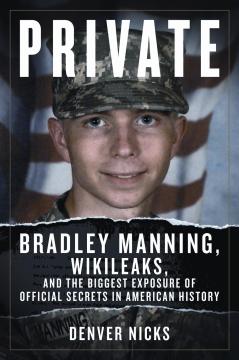 Army Private Bradley Manning represents a Rorschach tests for many Americans. The Army arrested the 24-year-old two years ago after classified material he allegedly downloaded from a military intelligence network while serving in Iraq ended up being made public by WikiLeaks. His supporters laud him for exposing war-crime atrocities, while critics label him a traitor.
Army Private Bradley Manning represents a Rorschach tests for many Americans. The Army arrested the 24-year-old two years ago after classified material he allegedly downloaded from a military intelligence network while serving in Iraq ended up being made public by WikiLeaks. His supporters laud him for exposing war-crime atrocities, while critics label him a traitor.
Manning is facing a military trial on a number of charges, including sharing classified information with an unauthorized source. He’s also charged with aiding the enemy — a capital offense — although the government has said it will not seek the death penalty. Author Denver Nicks, in his forthcoming book, Private: Bradley Manning, WikiLeaks, and the Biggest Exposure of Official Secrets in American History, plumbs Manning’s psyche in an effort to understand how Manning balanced his idealism with his demons. Battleland conducted this email chat with him last week:
What’s the most surprising thing you learned in reporting Private: Bradley Manning, WikiLeaks, and the Biggest Exposure of Official Secrets in American History?
Bradley Manning has been widely portrayed as a sort of lefty, antiwar activist, or as a bullied, embittered child who lashed out at the Army. I found him to be substantially different from those caricatures, and much more interesting. He’s quite independent minded. And despite his humble beginnings and emotional difficulties his life has been mostly characterized by headlong, bold ambition.
Why did you want to do this book?
It was clear early on that Manning was the real agent of change in the WikiLeaks drama. There have always been people willing to accept and publicize secrets, but never before was there a soldier of Manning’s inclinations in a position to leak such a massive quantity of information who took the daring step of actually leaking it.
This leak was, by far, the largest such event in the history of the United States and probably the world. I wanted to know what motivated this young man, where he came from, and who he was. In the first story in Wired that broke the news of his arrest it was pretty clear he wasn’t motivated by money, revenge, or political maneuvering, as are most people who leak state secrets, but by something closer to ideals, which is far more interesting to me. I wanted to understand that.

Chicago Review Press
Pull back the curtain on Manning, and tell us some things we don’t know about him.
There’s no doubt Brad Manning was troubled by his experiences in Iraq and unhappy about aspects of life in the military, but he’s far from anti-military or even anti-war. Early in his deployment to Iraq he mulled over re-enlisting and mused about the attractive notion of attending West Point.
He proudly told a close friend that he was being recruited for the United States Cyber Command, the Pentagon’s then-brand-new cyberwarfare unit based at Fort Meade. He spoke fondly of the prospect of getting experience working alongside the NSA. It seems he was most troubled not by American foreign policy in general or even the Iraq war specifically, but by the secrecy with which they were conducted.
Manning’s fairly straightforward, pro-transparency motivation is uncommon among those who leak information to the press, and gets easily lost in the left-right rhetoric that dominates our public life in the United States.
How guilty, to your mind, is Manning?
This is a complicated question. At this point it seems extremely likely that Manning was the source of the leaks he’s accused of perpetrating. The question of whether or not he’s guilty of each of the 22 Uniform Code of Military Justice violations he’s charged with is above my pay grade. Though I will say that charging him with aiding the enemy strikes me as a reckless overreaction.
Why?
Manning is charged with aiding the enemy for giving mostly-dated classified information to a person who he knew was going to put it on the Internet, where members of al Qaeda could see it. This, to me, is a far cry from something like surreptitiously sending battle plans to the enemy warning him of an incoming assault.
Leaks have become commonplace in this country due to our excessive secrecy. The functioning of our democracy is entirely dependent on leaks of classified information to the press. But by law information is supposed to be classified because its dissemination would cause serious harm to national security and for no other reason; and its only supposed to be made public after it’s been declassified.
From a purely legal standpoint a leak is a leak, whether from Bradley Manning or Leon Panetta. Are we going to start charging every official who leaks classified information, from the President on down, with aiding the enemy, or its civilian equivalent, treason? Charging someone with aiding the enemy for, basically, communicating with the press, needlessly endangers our free-press traditions by taking a perfectly good military regulation and applying it to a situation for which it was clearly not intended.
How complicit is the Army, in putting a troubled young man in a place where he could gather such intelligence?
In a sense the Army is absolutely complicit and at least partly responsible for Manning’s leaks. Information security was dreadful at Manning’s workplace in Iraq. And the chain of command repeatedly failed Manning after numerous incidents when his access to classified information should have been restricted or removed.
But on a more profound level, we citizens of the United States are responsible — this is a democracy after all. We tasked the Pentagon with fighting two simultaneous, poorly-planned, poorly-funded wars, yet we are surprised when we learn that the military was spread a little thin by the time Manning got to Iraq? Excessive secrecy and unfunded, unpopular wars are not Army policies, they are American policies.
In the end, this is my fault. And yours.
Is he a hero or traitor?
The more conversations we have about Bradley Manning in which neither of these largely meaningless buzzwords is said, the better off we’ll be as a country.


